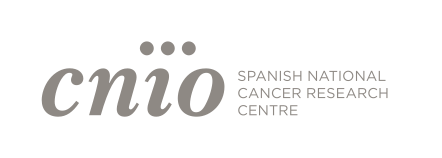Spanish National Cancer Research Center
Team Leaders
Team Staff
Institute Presentation
CNIO belongs to the Instituto de Salud Carlos III. It is a public foundation linked to the Ministry of Science and Innovation and the Ministry of Health. It employs, around, 400 persons (scientists, support, and administration). CNIO is one of the Severo Ochoa Centres of Excellence in Spain. It hosts 26 research groups, as well as support Units, organized in 7 scientific programs (Molecular Oncology, Cancer Cell Biology, Structural Biology, Human Cancer Genetics, Clinical Research, Experimental Therapeutics and Biotechnology) in the areas of Basic and Translational Cancer Research. It is recognized as one of the leading cancer research institutions worldwide and it ranks very high in the various international evaluations of biomedical research institutions. CNIO also has a long track-record of achievements in the area of drug development and innovation, with the activities of the Experimental Therapeutics Program and the licensing of several of the molecules discovered at CNIO to major pharmaceuticals. CNIO has established partnerships with national and international hospitals, research centres, Universities, biotechnological and pharmaceutical companies. CNIO is deeply committed with society and it promotes multiple activities direct to the general public, secondary and high school students, and society in general. The Communication department is committed to develop a coherent and homogenous strategy to disseminate cancer information and the major research activities of the center, in particular.
The scope of the research carried out by the Genetic and Molecular Epidemiology Group (GMEG) ranges from the identification of aetiological agents and mechanisms, to the translation of the findings into the clinical and Public Health domains, focusing on bladder, pancreatic, and breast cancers. GMEG employs a wide variety of biomarkers to better characterise exposures, genetic susceptibility patterns, and cancer outcomes. Omics data provide a unique opportunity in this regard and the Group explores its integration in epidemiologic studies. The strategic goals of the Group are to: 1) Identify non-genetic and genetic factors, as well as their interactions, associated with cancer development and progression and with its molecular/omics subphenotypes; 2) Develop and apply statistical-AI/bioinformatics tools to model the risk and course of patients with cancer by integrating epidemiologic and clinical data with omics information; and 3) Assess clinical and public health strategies for cancer control using current genomic tests and data.
In PANCAID, GMEG is leading the work package 3 which is in charge of providing a robust and reliable data management platform to handle, standardise, and retrieve data from several layers of information (host, clinical, tumour, and both multi-omics and non-omics biomarkers) for data analysis using classical and AI-based approaches.
Dr. Peinado´s laboratory is located at the Spanish National Cancer Research Centre (CNIO), in Madrid. Spain. The CNIO was founded in 1998 within the Institute of Health Carlos III (Instituto de Salud Carlos III, ISCIII), with the undertaking of developing a comprehensive project for excellence in oncology research. The CNIO is currently recognized as one of the top leading Cancer Research Institutes in the World. According to its mission, the CNIO conducts research of excellence in oncology, translates scientific knowledge into clinical practice. All groups at CNIO are actively collaborating with partners from all over the world in outstanding international consortia, many of them funded by the EU Framework Programme. These include collaborative projects in Health topics, networks of excellence, coordination and support actions, IMI and EURATOM projects, infrastructures development, Marie Curie grants and prestigious European Research Council (ERC) grants.
Dr. Peinado´s laboratory is specialized in the analysis of the role of extracellular vesicles in the pre-metastatic niche formation and their use in liquid biopsies. Dr. Peinado is a pioneer in the field of extracellular vesicles, he has published seminal work about the role of exosomes in educating the tumor microenvironment along metastatic progression (Peinado et al. Nature Medicine 2012) and metastatic organotropism (Hoshino et al. Nature 2015). More recently, he has published work about the use of exosomes in liquid biopsies using DNA to detect tumor mutations and identify minimal residual disease (Thakur et. al. Cell Research 2015, García-Silva et al. Journal of Experimental Medicine 2019, García-Silva et al, Journal if Investigative Dermatology 2023) and their implication in lymph node pre-metastatic niche formation (Garcia-Silva et al. Nature Cancer 2021).
In this grant, Peinado´s group will profile extracellular vesicle-shed micropeptides candidates in plasma from PDAC patients. We will use the unique fingerprint obtained from PDAC-secreted micropeptidome to define their potential use in early diagnosis. Our previous data generated by machine-learning classification of plasma-derived EVs protein cargo in detecting cancer. In this aim we will perform these approaches in collaboration with CNIO proteomics / bioinformatics unit to train and define a novel PDCA-secreted micropeptidome associated to early PDAC.

Contact
Genetic and Molecular Epidemiology Group
Calle Melchor Fernández Almagro, 3
28029 Madrid
Spain